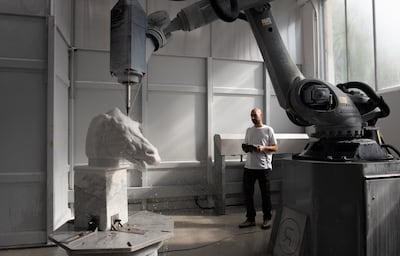A robot-made replica of the ancient Parthenon Marbles is going on display in London on Tuesday amid “fast and furious” negotiations between the British Museum and the Greek government on the return of the originals to the EU country.
Using 3D technology and a surreptitious scan of the original ancient Greek statues on display at the British Museum, the Institute for Digital Archaeology in Oxford created a full-scale reproduction of the Selene Horse carved from the same Pentelic marble used to make the originals.
An additional replica of a metope showing the mythical battle between Centaurs and Lapiths at the marriage feast of Peirithoos is currently being made.
Ahead of the work’s unveiling at the Freud Museum in London, the Institute’s Director told The National the replicas were made to “support” ongoing discussions around the objects’ repatriation and added he felt “confident” a deal would be concluded soon.
“I can’t reveal all the details but a very sensible deal has been worked out and there is a fast and furious timetable for their conclusion,” said Roger Michel of the reported negotiations between the chairman of the British Museum, George Osborne, and the Greek ambassador to the UK, Ioannis Raptakis.
Mr Michel said he expected a deal on the return of the 2,500-year-old friezes to be implemented before the next Greek elections in 2023.
More commonly referred to in London as the Elgin Marbles, after the Scottish nobleman Thomas Bruce, known as Lord Elgin, who in the early 1800s stripped the marbles from the Parthenon Temple on the Acropolis in Athens and shipped them to Britain, the ancient objects have been at the centre of a decades-long dispute between the UK and Greece over their return.
Mr Michel said the replicas, carved using the advanced technological wizardry of Robotor ― the machine built to reproduce 3D designs with stone materials ― showed what high-quality knowledge and machinery could produce to make “everyone a winner”.
“Instead of having a winner and a loser in this conflict, we tried to figure out what each side wanted,” Mr Michel told The National.
“The British Museum is an educating institution and has always said it wanted to show the art of antiquity in context. What we can offer them is a better reflection of the reality of the history, meanwhile Greeks will get their precious objects that are a part of their national patrimony back.”

The institute’s founder said that the British Museum’s “pure white” marbles were misleading and criticised the London museum for “a certain disrespect” towards the Greek sculptor Phidias whose ancient works are on display with parts missing.
Mr Michel said that other replicas would be painted with the vivid colours, such as brown skin tones, that Phidias used for the originals. Painted replicas and virtual reality can “really show how antiquity looked” he added.
The display of the replica at the Freud Museum will be accompanied by an augmented reality display of the original horse’s head at the British Museum. Mr Michel said the institute is in discussions to exhibit the replica at the Louvre Museum in Paris after its preview in London.
The Oxford based institute have also created a 3D model of the museum’s Duveen Gallery, where the marbles are held.
“It means we can put the British Museum anywhere in the world but really it’s the museum that should be doing it so that anyone, anywhere in the world could be ‘visiting’ their collections,” said Mr Michel.
Lamenting the British Museum’s slow take-up of technology to update and share its exhibitions, the director said he hoped his institute’s work “marks a whole new age” for one of the largest holders of international artefacts in the world.

“The reality is that the British Museum is going to have return a lot of things,” says Mr Michel, reflecting the growing public calls for the repatriation of looted colonial-era objects.
A number of British institutions have been steadily returning disputed objects in recent years, most notably the Benin bronzes to Nigeria. However, the British Museum has resisted repatriating stolen objects, including the Parthenon Marbles.
The resistance is partly a result of legal limitations given the British Museum Act of 1963 and the Heritage Act of 1983 forbids the disposal of objects without an Act of Parliament.
There are nevertheless ways to circumvent these restrictions and while the British Museum and government have consistently ruled out permanently returning the Greek sculptures, Mr Osborne did say recently that he thought there was “a deal to be done where we can tell both stories in Athens and in London”.
For his part, Mr Michel hopes that “making additional pies” in the form of top-notch replicas is making a deal easier to finalise.
“It’s great to think that something that has been festering for two hundred years can be resolved with technology,” he said.
“Both the UK and Greece can be winners, which is good news for everyone.”


